Ryan Schneider's Blog, page 22
November 5, 2012
10 Questions with Suspense Writer Russell Blake (@BlakeBooks)

This author spotlight features acclaimed best-selling author Russell Blake.
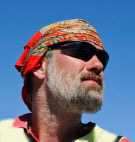
Russell Blake was named one of the most popular indie novelists of 2012 and is the bestselling author of seventeen novels, including the thrillers Fatal Exchange, The Geronimo Breach, Zero Sum, King of Swords, Night of the Assassin, Revenge of the Assassin, Return of the Assassin, The Delphi Chronicle trilogy, The Voynich Cypher, Silver Justice, JET, JET II - Betrayal and JET III - Vengeance. Non-fiction includes the international bestseller An Angel With Fur (animal biography) and How To Sell A Gazillion eBooks In No Time (even if drunk, high or incarcerated), a parody of all things writing-related. Blake lives in Mexico and enjoys his dogs, fishing, boating, tequila and writing, while battling world domination by clowns.
Russell is a proud member of RABMAD – Read A Book, Make A difference.
This author spotlight is a focus on Russell's JET series. JET 3 - VENGEANCE (see above) is now available. It is the follow-up to JET (see below)

and JET 2 - BETRAYAL.

1. How did you get into writing?
I’ve been a lifelong voracious reader, and one day about a fifteen years ago I woke up and thought, “I could do that.” I tried my hand at a variety of things I was interested in writing, all of which were crap, and eventually I started penning works of fiction. I chucked all the early stuff because it was embarrassingly amateurish, but over time, I noticed that it started sucking less. And eventually, it got to the point where I was willing to show it to a few friends, who were kind, but critical. That convinced me that if I kept at it, I might eventually be able to write something people would be willing to read. Last June, I finally took the plunge and published my first thriller, Fatal Exchange.
2. What do you like best (or least) about writing?
I would have to say that the joy of creating whole worlds on paper, and figuring out how to bring the reader into them, is the most gratifying, along with when you nail that one sentence and it sings. The worst thing is what it does to your legs. Sitting for long periods of time is lousy for the anatomy.
3. What is your writing process? IE do you outline? Do you stick to a daily word or page count, write 7 days a week, etc?
I write seven days a week, either a blog, interview, or working on a novel. When I’m writing a novel, I spend 12 hours per day writing, and average seven to eight thousand words a day, if I’ve outlined it. If not, maybe five thousand, as more time is required to figure out what happens next. Nowadays, I do a two to three paragraph outline that is a synopsis of the story, and then about the first fifteen chapter outlines – usually five words or less per chapter so I know what comes next. Then I write.
4. Who are some other writers you read and admire, regardless of whether they are commercially “successful?”
I think the writer I most admire has to be David Foster Wallace. Infinite Jest is a triumph unlike any other, and should be required reading for those who think, “Show, don’t tell” is some sort of a divine commandment. That book, above all others, redefined what writing could be for me, and although my style is very different, it still remains a seminal work. Robert Ludlum is one whose work is closer to mine in style, and the man knew how to write a thriller. He had an amazing career, and justifiably so. Frederick Forsythe is another icon whose work always inspires and humbles. And lately I’ve been reading James Lee Burke, who is brilliant and thoughtful and everything I aspire to be in terms of his descriptions and use of language.
5. Should the question mark in the above question be inside or outside the quotes?
Outside. I tend to go with the American convention – commas and periods inside no matter what, question marks logically. If the question mark isn’t part of the quotation being cited, then logically it belongs outside. Although I get into pissing contests with my editor, who is a Brit, as they tend to place periods and commas logically, not monolithically, within or without.
6. What’s your stance on the Oxford Comma?
Ah, the good old serial comma. I think it’s valuable and should be used. Reduces ambiguity and follows the natural cadence of speech. I know there’s a movement to reduce its use, but it’s misguided.
7. What is your book JET about and how did it come to fruition?
While I was writing Silver Justice, which features a no-nonsense female FBI agent protagonist, I started thinking about writing a more over-the-top female protag – sort of a female Jack Bauer crossed with James Bond. Fantastical, large-than-life, nearly bulletproof and invisible. Pure, escapist action thriller fun, with an exotic heroine that you could cheer on, but who also had intriguing depth and flaws. The idea presented itself as “Kill Bill meets Bourne.” And I wanted it to be the fastest-paced book I, or anyone, had ever read. Non-stop. Relentless from the first paragraphs. Tall order, but I am told that the result speaks for itself.
8. What’s your current writing project?
I’m getting ready to start the fourth in the JET series, then the fifth in my Assassin series. Both will released by year’s end. Next year, only four novels. No more. Unless it’s five. But I’m going to shoot for only four.
9. What book(s) are you currently reading?
None. I can’t read while I’m writing. It tends to color my work too much. And since all I’ve been doing is writing lately, I haven’t had much chance to read. Last book I really, really liked was RS Guthrie’s “Blood Land.” Masterful indie writer with a bright future. Before that, I read Simon Royle’s Bangkok Burn, which was a fun romp in an exotic locale.
10. Who or what inspires your writing?
Mostly, pride of craft. We are all still learning as we write – I don’t care how many thousands of hours we’ve amassed – and it’s that desire to achieve personal bests that keeps me at it, tapping away. I suppose the good news is that you get better at it as you progress. The bad news is you never get quite good enough to be satisfied, if you’re like me. Goes with the territory of trying to improve, I guess.
Finally, is there anything you’d care to add? Please also specify where readers can learn more about you, buy your books, etc.
Ryan, thanks so much for having me on to prattle about my scribbling. Readers can find my 19 novels at my author page on Amazon, and can read my thoughts and musings, such as they are, at my blog, at http://RussellBlake.com.
Thanks, Russell. I thoroughly enjoyed JET and look forward to reading further installments.
Come and visit with us again when JET 4 is ready!
Be sure to check out Russell's books on Amazon or his website. the JET series could be the next Jack Ryan series.
Published on November 05, 2012 14:34
October 31, 2012
Halloween Special! All my stories are FREE on Amazon for 1 DAY ONLY!

Normally, I try to be very subtle in promoting my work.
But not today!
In honor of Halloween, I'm running a rare, special event: all my short stories and two novellas are absolutely 10,000% FREE on Amazon.com.
Now is your chance to grab as many stories as you can carry. I've got two science fiction and fantasy novellas, spiritual fiction, literary fiction, dark and twisted adult fairy tales, stories of time travel, deals with the devil, even a surprising tale about a very special eight-legged cephalopod with a crush on his owner.
 Hello. My name is Darby.
Hello. My name is Darby.So don't be shy! Take as many stories as you like. Take them all! You can read them at your leisure, but at least you'll have them.
The short story is widely regarded as the most difficult literary format. I trust I've done my forebears justice. But I'm happy to let you be the judge.
So browse through my author page, sweep all the stories off the virtual shelf and onto your Kindle, then dig in. Short stories won't cause cavities or weight gain, and you don't need to have your mom or dad check them for razor blades before you take a bite!
Then, when you've had your fill, kindly post a brief review on Amazon. This drastically increases an author's sales ranking and is more important than most people realize.
So run, don't walk, to Amazon and get these goodies before it's too late!
And, sincerely, thank you.
RYAN
H A P P Y H A L L O W E E N !
Published on October 31, 2012 03:28
October 30, 2012
10 Follow-Up Questions with Thriller Writer R.S. Guthrie (@rsguthrie)

This is a very special Author Spotlight, for it features the return of thriller writer R.S. Guthrie, author of MONEY LAND (see above).
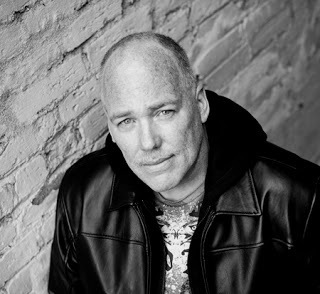
Since Rob was last featured on this blog in January 2012, he has been burning up the Amazon charts with record books sales. His new thriller series promises to be in the Kindle Top Ten very soon.
R.S. Guthrie grew up in Iowa and Wyoming. He has been writing fiction, essays, short stories, and lyrics since college.
"Black Beast: A Clan of MacAulay Novel" marked Guthrie's first major release and it heralded the first in a series of Detective Bobby Macaulay (Bobby Mac) books. The second in the series (Lost) hit the Kindle shelves December of 2011.

Guthrie's "Blood Land" is the first in the Sheriff James Pruett Mystery/Thriller series and represents a project that is close to his heart: it is set in a fictional town in the same county where he spent much of his childhood and still visits.
Guthrie lives in Colorado with his wife, Amy, three young Australian Shepherds, and a Chihuahua who thinks she is a 40-pound Aussie!
Readers can catch up with what's new with the author at his official site, http://www.rsguthrie.com , or discussions related to writing at his blog, Rob on Writing (http://robonwriting.com).
1. This is a follow-up interview, but for people who are not already familiar with your work, tell us what kind of books you write and what readers should expect from your stories, and what is your latest novel Blood Land about?
Well thanks for having me a second time, Ryan (I think that’s a good sign)! Mainly I write what are classified as Mysteries or Thrillers. To be honest, I feel like genres mean different things to different people. I write books about characters that we can all relate to; I tend to do that in a setting around a cop solving a murder case (or multiple murders). But my books are about the people in them as much as the story.
Blood Land, for example, is set in a smaller town, where the sheriff’s own wife has been murdered and the prime suspect is her own brother. Of course, nothing is ever as it first appears—I prefer to write about heroes with flaws in them. There are no perfect people and I love relating to characters when I read, so that’s how I write.
2. What was the duration of the writing process for Blood Land?
Every book is different and Blood Land was a novel I started and then put on the back burner for a while, not because I didn’t like it—just the opposite; it was because I wanted to really take my time. One technique I like to use is to walk away from a book for a while and then come back and read it as a true reader would. I did this several times with Blood Land and I think it made all the difference. Overall it was about a year.
3. When Blood Land is adapted to film, and the producers ask for your dream cast, what will you say?
That’s a difficult question to answer without giving away a spoiler. How about my dream director? There has never been any doubt in my mind that Clint Eastwood could bring this story to life on the big screen. I have had more than a few readers say they can see this as a film. I just wish Clint was one of them!
4. Stephen King often makes a cameo in films adapted from his work. Stan Lee is also enjoying doing so these days. What supporting role would you like to play in the film adaptation of Blood Land?
I love it when directors or writers show up in cameo roles. Oliver Stone and Sydney Pollack do, too. I remember Stephen King in Maximum Overdrive trying to take money out of an ATM and being told to eff-off. There is a small role in my story for a guy named Roland Pape. He’s the owner of the bar where the murder suspect is cornered and his only role is to hide in the shadows and then come out when the action is over. No lines. I think I could handle that.
5. For a writer, word of mouth is everything. What was the last book you read that you enjoyed so much that you wanted to share it with everyone you know?
Honestly it’s been a while since I’ve read a book that I would recommend to everyone I know because I tend to read within my genre and I think a book has to be really outstanding to cross boundaries and be great for everyone. I read a LOT of James Lee Burke, and all of his newer books are read by actor Will Patton in their audio format. Burke is an absolute genius and a poet and when Patton reads them, WOW, I am telling you, that’s a recommendation I would make to everyone. The combination of the two is something truly magical.
6. As of this writing, the trend in publishing is toward series novels as opposed to stand-alone books. Is Blood Land part of a series? If so, where do you see the story going (ie how many books in the series)? If not, do you have a series you’ve written or plan to write, and if so, what is it? And if not, good for you. The squeaky wheel gets the grease!
Well, as with Amazon, I was into “the series” long before they were the trend in publishing (I shopped at Amazon when they first started selling things other than books, and people laughed at me and said you bought what at Amazon??). So though I am not the squeaky wheel in this case, I am also not a bandwagoner. I always knew I wanted to write series. My favorite authors (John D. MacDonald, James Lee Burke, Dennis Lehane,) all have series that repeat the same heroic character(s), and that’s what drew me to the series.
Blood Land features twenty-first century sheriff James Pruett and I believe I’ve written him as a person who readers are going to miss when the book ends (I’ve already had many people ask me if and when he’s returning—next month, in fact!!).
The great thing about a series is you know you get to see some of your favorite characters again—you mentioned Stan Lee. That was always the draw of comic books (another genre on which I feasted in my youth, Lee’s Spiderman being my all-time favorite). But it was also Peter Parker, Mary Jane, Uncle Ben, and even J. Jonah Jameson. I came back not only for the next superhero/villain conflict but for all the characters as well.
7. Saul Bellow said “You never have to change anything you got up in the middle of the night to write.” Where do ideas for your books come from, and where are you and what are you typically doing when inspiration strikes?
Saul has it right. I have almost a hundred percent of my ideas in a semi-state of sleep, in the hinterland just before the subconscious kicks in. Many great writers (Shakespeare, Hemingway, Tennyson, Conrad) all believed we live most in our dreams and from there comes our inspiration as writers. I wake up in the middle of the night and write things down (thank God for the iPhone—now I can do it without having to leave the warm comfort of bed)!
8. Brett Easton Ellis once said, “Do not write a novel for praise. Write for yourself; work out between you and your pen the things that intrigue you.” Indie publishing phenom Amanda Hocking has said that it messed with her head a bit when she realized so many people were going to read the books she’s now writing. Now that R.S. Guthrie is rapidly gaining recognition in the publishing world, has an established fan base anticipating his next novel, and is being talked about in the highly-reverent third person, will reader expectation influence how and/or what he writes? Or will he hold to Ellis’ suggestion?
A little of both. Grand notions are difficult to put into practice sometimes. Like thick skin—we all know we should have it, and not become too despondent over one person’s criticism, but somehow it still stings.
I don’t write for praise, but at the same time, I want my work to be good (and well-received). We all do. And if we are going to listen to the praise, we must also listen to the criticism. But would the need for praise ever completely change my writing? No. Money on the other hand…
9. The world of Indie authors is the new slush pile. What are you going to say/do when a traditional New York publisher and/or agent contacts you and asks for a meeting?
I’m going to take the meeting, but my first question is going to be “what can you do for me and still give me a 70% royalty?” In all seriousness, it’s a tough deal. Would I love to be in Penguin or Simon & Schuster’s stable of writers? Sure. But most of that is pure vanity. I want to sell books, and unless I am already proven completely, a big publisher isn’t going to invest anything in me (but I’ll still be paying out the nose for an agent, publisher, etc.). I would love to write at least one book for a known publisher, just to say “see, not all Indies are crap—there are many of us who can write.” And then go back to publishing independently.
10. Someone once said, and it may have been my dad, “If you fail to plan, you plan to fail.” Where do you want your writing career to be in five years’ time?
My writing dream has always been to support myself (and family, of course) with it. In other words, write for a living. I wouldn’t mind fame and fortune along the way, but that’s not in the five year plan. What I want to see within five years is my book (or books) on the bestseller list. NYT, Amazon—I really don’t care. But not in /Family/Relationships/Auto Parts, you know? THE bestseller list. Top 20-30 would be fine.
Finally, because no artistic endeavor is a solo flight, would you care to share the names and contact info for your supporting players, namely your cover designer, editor, proofreader(s), research assistants, hairdresser, dog groomer, chauffer, maid, butler, etc?
I honestly owe a HUGE debt of gratitude to writer Russell Blake (JET series, Silver Justice, to name just a few). He’s mentored me quite a bit in the “ways of the world” and he’s even introduced me to my cover designer (Ares Jun) and my new editor with whom I’m working on Money Land, the Blood Land sequel out next month.
I also owe huge props to my wife. She has read every word I’ve written more than anyone else (excluding myself). Honestly, she reads each book (when it’s said and done) at least 4-5 times start to finish (and I don’t know how many times in pieces). She also travelled with me recently to my first book show and if not for her I would have let my idol, James Lee Burke walk by with a simple “Hello”. She called him back to the table where he talked with me for 10-15 minutes AND accepted an autographed copy of Blood Land.
Wow, that's great, Rob. You know what they say, "Behind every great man is a great woman rolling her eyes."
Thank you for sharing your new book MONEY LAND with us and keep up the good work. The third installment will surely be a big hit as well.
Learn more about Rob at his official site, http://www.rsguthrie.com , or discussions related to writing at his blog, Rob on Writing (http://robonwriting.com).
Published on October 30, 2012 14:04
October 23, 2012
10 Questions with Fantasy Novelist James A. West (@JWestBooks)

This Author Spotlight features Fantasy novelist James A. West, author of THE GOD KING (see above).
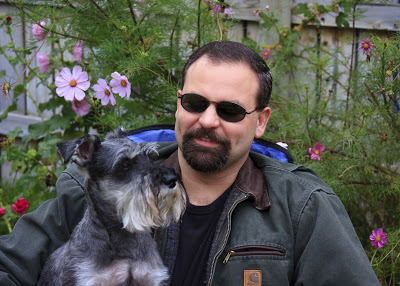
When James was thirteen years old, he read The Talisman, by Stephen King and Peter Straub, and a seed of an idea was planted that someday he, too, would create different worlds and realities.
After a stint in the US Army, a year as a long-haul truck driver, and a couple as a log home builder, he enrolled at the University of Montana. There, he majored in Psychology and, by chance, took a creative writing course. Words started to flow, and worlds were born.
James lives in Montana with his wife and his bodyguard, a Mini-Schnauzer named Jonesy.
James is also the author of CROWN OF THE SETTING SUN, the second installment in the Heirs of the Fallen series...

and REAPER OF SORROWS, the first in the Songs of the Scorpion series.

1) How did you get into writing?
Reading was my gateway drug to writing. I started reading adult fiction in second grade, so I was exposed to genre fiction a little more exciting than Dick and Jane chasing Spot around. Sometime between then and my freshman year in high school, I moved from creating my version of comic books (I sucked at drawing), to writing what would be called flash fiction these days.
As far as sitting down with the idea that I was going to write a novel, well, that took a lot longer. For whatever reason, it never crossed my mind that regular people could do such a thing. In the end (maybe I should say the beginning) a nightmare about a pack of ravening demon dogs set me on the writer’s path. That story, by the way, never went anywhere, but it was the first long work I’d ever written, which convinced me that I could write longer fiction.
2) What do you like best (or least) about writing? The best and worst thing about writing are the ideas. I love coming up with ideas, but I also hate it, because there is just not enough time in my life to ever write everything I would like to.
What I struggle with is marketing—I would probably have a hard time giving away gold nuggets for free. But, whether you are traditionally published or an indie author, you have to get your work in front of people without being spammy. I don’t like spam any more than anyone else, so basically my marketing strategy is to write and publish, and then hope people stumble across my work and like it.
Recently The God King, my first novel in the epic fantasy series Heirs of the Fallen went free on Amazon through their price matching program—I’ve been waiting for this to happen so long I thought Amazon had blacklisted me! I know a lot of authors say they would never give their work away free, but in the last several days all those free copies of The God King have translated into more sales of the second book in the series, Crown of the Setting Sun, than I’ve had in the last several months. With that said, I’m sold on offering up some of your work for free.
3) What is your writing process? IE do you outline? Do you stick to a daily word or page count, write 7 days a week, etc?
I have the basic idea about the story when I start it. I also have a chapter/paragraph form of outlining that I do, which basically guides me along. Most often, I end up re-writing those chapter/paragraphs three or four times, because the story ends up going where it wants to, leaving me to compensate.
I try to average 1,000 words a day, 6-7 days a week. Usually, I do not meet this goal, as I tend to write slowly. That being said, the first draft of most everything I write generally ends up pretty close to where I want it. If it takes me say, three months to write an 80,000 word novel, it only takes about 4-5 days for me to edit it, so I’m slow on one end, fast on the other, and that’s a big time saver.
4) Who are some other writers you read and admire, regardless of whether they are commercially “successful?”
This is a tough one to answer, because in answering I might end up sounding snobby or unenlightened, depending on who evaluates my response! Also, keep in mind that I personally read and write for entertainment and escapism. I don’t mind deep thoughts and questions about the human condition, but I prefer to gently touch on those matters when I read and write.
Having said that, until recently I rarely read anything that was not commercially successful. With the whole independent author thing and acquiring a Kindle, I read many more unknown authors than before. I’m really enjoying the books I’m finding out there. However, I still go back to my favorites like Stephen King, Neil Giaman, Dean Koontz, Douglas Preston & Lincoln Child, Robert Jordan, George R.R. Martin, Terry Brooks, just to name a few.
5) Should the question mark in the above question be inside or outside the quotes?
Inside. Right or wrong, that is the way I learned to write punctuation when dealing with dialogue, and I’m sticking to that. If nothing else, I’ll be consistent in my wrongness.
6) What’s your stance on the Oxford Comma?
I usually stick to it for no other reason than that is how I learned to use the series comma. Lately, however, I’ve taken to excluding that third comma if it does not diminish the clarity of a given sentence.
I have never been in league with the grammar police, and I prefer readability, which generally means proper grammar is a benefit. However (and I know a lot of people might cringe when I say this) with fiction, comma usage, and all grammar to a degree, is flexible. Think writing action scenes vs. descriptions. Action requires a staccato, abrupt delivery, sentences that drive the reader to read faster. Description, not so much.
7) What is your book THE GOD KING about and how did it come to fruition?
The God King is the first book of my epic fantasy series, Heirs of the Fallen. Book two, Crown of the Setting Sun, is also out.
As to how it came about … well, as a fantasy fan myself, I always wanted to hear more about those mythical dark times, when things did not go well, when the good guys lost, and humanity was trying to bounce back from near extinction.
When I stared writing The God King, I decided to start off the story with the world getting ripped apart by the unleashing of godlike powers never meant for mortal hands. After that, it’s up to the heroes to survive and keep things from getting worse. Whether they achieve that goal is still in question, as I go into book three.
8) What’s your current writing project?
I recently finished Reaper of Sorrows, book one of the series, Songs of the Scorpion. I’ll go into more detail with your last question J
What I’m writing at the moment is book three of my Heirs of the Fallen series. I’m hoping to finish this book and another Scorpion book by the end of the year.
9) What book(s) are you currently reading?
I just finished American Gods by Neil Giaman, and have now jumped into Michael Moorcock’s books. I dig the fantastic, so I tend to stick with works that go beyond the reality of the world around me. I also crave good thrillers.
10) Who or what inspires your writing?
Any good story, whether it is told on the big screen, on TV, or in a book, really gets me going. Some might call me an escapist, and that suits me fine.
Finally, is there anything you’d care to add? Please also include where people can read your published stories, buy your book, etc.
I am not giving away any spoilers, but Reaper of Sorrows, the first installment in my Songs of the Scorpion fantasy series came out mid-September. This will be an ongoing series of stand-alone novels about Rathe Lahkurin, a battle-tested commander who has it all: fame, stunning battle skills, luck with the ladies … and an unshakable curse of ill-fortune that trumps all his blessings. Wherever this poor bastard goes, trouble chases after him, or is waiting for him with fangs bared at the end of a dark path.
Essentially, I wanted to write some fantasy works reminiscent of the classic Sword and Sorcery stories written by men like Robert E. Howard and Michael Moorcock.
There will be a lot of grit, badasses being badasses, pretty girls who pine for pretty swords and know how to use them, leprous beggars with rusty knives hidden up their sleeves, and anything else that fits the settings and plots of a world rife with sorcerers, necromancers, unspeakable monsters, and nefarious ne’er-do-wells.
Reaper of Sorrows was an absolute blast to write, and I hope everyone enjoys it!
For anyone interested in my stories, you can go to my blog here and click the book covers. That will take you to the Amazon link for each one.
Thank you for reading, and thank you so much to my host Ryan! I really appreciate you having me here!
You're very welcome, James. Your books look fantastic. Be sure to visit with us again when the next installments of your books are available.
Be sure to visit James' blog and follow him on Twitter.
Published on October 23, 2012 02:46
October 16, 2012
10 Questions with Supernatural Novelist D.A. Brown (@Author_DABrown)
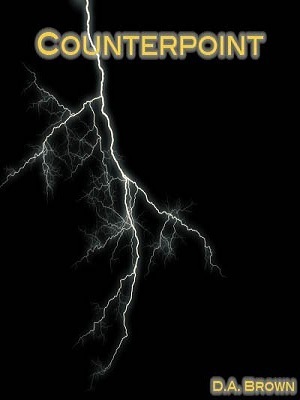
This Author Spotlight features supernatural novelist D.A. Brown, author of COUNTERPOINT.
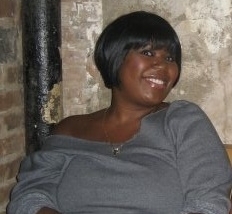
D.A. Brown is a 28-year-old author living in New York, NY with her Mac Book and various flights of fancy. She is a graduate of both Howard University in Washington, D.C., where she received her B.S. in Political Science and of Thurgood Marshall School of Law at Texas Southern University, where she received her Law Degree. In her free time she enjoys writing (naturally) and practicing not ripping her hair out while writing. Occasionally, she also enjoys sleep; although she cannot remember the last time she actually had any.
1. How did you get into writing?
I became interested in writing at a very early age. Even in school as a child, it was my favorite subject and something that I explored in various mediums, from short stories to poetry, to my first novel, Counterpoint. On a certain level, I believe it is a passion that you are born with and so one could say that I was always interested in writing, even when I wasn’t.
2. What do you like best (or least) about writing?
Interestingly enough, the things that I like least and best about writing are the same things. It’s the isolation and competition within myself that I love about it dearly, and that at the same time drives me insane. I love that I can tell my own story, and that it is just my story. And I hate that I have to carry that burden alone and that I cannot share it with anyone. You are the only person who can write your stories.
3. What is your writing process? IE do you outline? Do you stick to a daily word or page count, write 7 days a week, etc?
My writing process varies from novel to novel. With my first novel, Counterpoint, it was such an intense passion and push for the words to be out of my head and into the atmosphere. Initially, I did set a daily page count, and realized that stories are living, breathing entities of their own; and when it is time to write, it is, and when it’s not, it’s not. It can’t be forced or dictated, it can just be obeyed. Now in my second novel, I spend a lot of time contemplating the how and the where of the story telling and let the words come forth as they wish, in the time that they want.
4. Who are some other writers you read and admire, regardless of whether they are commercially “successful?”
Christopher Buckley is the author that I admire the most. If every musician is chasing the greatness of Michael Jackson’s Thriller, then I am chasing Christopher Buckley’s Boomsday. The way he weaves intelligence and humor and compassion through his tales in an endless, unbreakable seam is truly something of wonder.
5. Should the question mark in the above question be inside or outside the quotes?
I would say that the question mark belongs outside of the quotations since the question mark references the question as a whole and does not just pertain to the word successful. But don’t quote me on that that!
6. What’s your stance on the Oxford Comma?
I think that, like everything in literature, it has its place. It really depends on what the writer is trying to convey and what they want their reader to walk away with. Writing is a tangible manifestation of what we speak and feel; and as human communication redefines itself with each new generation, there can be no absolutes. Grammar has to be able to evolve.
7. What is your book Counterpoint about and how did it come to fruition?
Counterpoint, on a smaller scale, is about a woman, Oro Stillwater, who is struck by lightning and develops supernatural powers. In the course of learning about her powers, she falls in love with Anthony Giordano, a man who has been her confidant and friend for several years. Her powers generate unexpected threats and dangers, as well as gifts and opportunities that she must navigate as a superhuman. It isn’t until she fully begins to surrender herself to what she has become that she learns who she truly is and the purpose that her life has.
On a greater scale, Counterpoint is about having a pressing need that you can’t identify, and having that need met by something that you least expected to fulfill it. I wrote Counterpoint at a very barren point in my life. I was unemployed and emotionally desolate. I never knew that what I needed was to sit still and pursue my passion. I never thought writing was what I needed and it turned out that it was all that I needed. What Oro thinks she needs is superficial to what will truly sustain her.
8. What’s your current writing project?
My current writing project is Lurien: The Redeemer. Keeping with my love of all things supernatural and without giving too much away (insert wink and laugh here), it is about human-angel hybrids that are the direct descendent of Adam and Lilith in the Garden of Eden prior to Eve’s arrival; and all that they go through to save their species from the constant threat of annihilation. It’s intense, and a lot! It is a glorious and enraging challenge. I love and hate every minute of it!
9. What book(s) are you currently reading?
I am currently re-reading Hamlet for probably the one-millionth time. Hamlet is the fictional character that I most identify with in all of literature. His constant confusion at the world around him and living on the brink of insanity; it resonates. No one ever really knows how close he is to losing his sanity, and his struggle to remain level is often taken for granted. I feel that is something that everyone can identify with, the daily struggle to retain control of one’s mind.
10. Who or what inspires your writing?
My inspiration for writing comes from so many places! Ultimately, my inspiration comes from the various forms of freedom that I am trying to obtain daily. I like to write about the disparity between the massive amounts of fight that is required to obtain the smallest amount of freedom, be it spiritual, emotional or physical.
I am also very inspired by comic books and superheroes. The idea of being so completely different from everyone else that you have no choice but to be who you are and embrace that to the fullest capacity intrigues me; especially in a society where standing out is something that is viewed as antagonist. I suppose it ties into the isolation that I associate with writing, being the only one who can do what I was put here to do. There may be a million writers, but those writers are the only ones who can write the stories that they are going to write. The singularity of it all is highly magnetic.
Finally, is there anything you’d care to add? Please also include where people can read your published stories, buy your book, etc.
People can download Counterpoint for their Nook, Kindle, iPad or any e-Reader that they own. The book is available for purchase from www.barnesandnoble.com as well as www.amazon.com for $4.95. Search “Counterpoint by D.A. Brown” and it will come up!
I’d like to leave all of my readers and fans, new and old, with the knowledge and understanding that they were not called to writing by accident. There is a unique and specific purpose in every word that they draft. We are called to an elite and higher purpose as writers; and no word, no matter how trivial, is ever in vain. And of course, I want readers and writers to keep reading and keep writing. Success is not given, it is taken; by grace and by force, and by unshakable mandate is taken, and also by these means kept.
Thank you, D.A. Wise words well said. Greatest of luck with COUNTERPOINT and with all future writing endeavors.
Be sure to check out COUNTERPOINT, and follow D.A. on Twitter.
Published on October 16, 2012 16:57
October 9, 2012
10 Questions with Fon Davis, creator of MORAV (@Foncocreative)
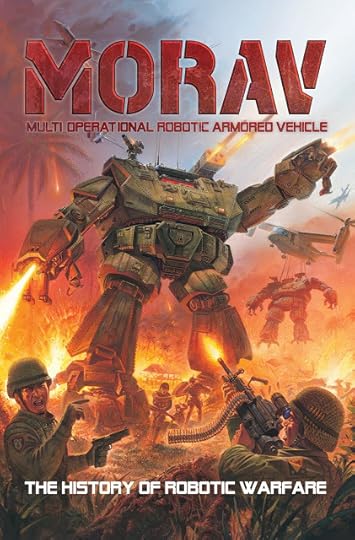
This Author Spotlight features Fon Davis, creator of the graphic novel MORAV: The History of Robotic Warfare.
Read on for a chance to win a free, signed copy of MORAV.
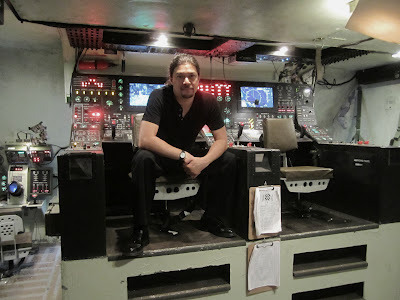 Fon Davis on-set inside MORAV cockpit
Fon Davis on-set inside MORAV cockpitFon Davis has been working in the entertainment industry for nearly 25 years, during which time he has had a hand in more than 30 feature films, including Pearl Harbor, Starship Troopers, Galaxy Quest, Terminator III, Mission Impossible III, and the Star Wars and Matrix series.
Fon has a diverse background that includes working at the Industrial Light and Magic model shop, serving as a concept designer and model maker for Disney, and contributing to acclaimed stop motion films such as The Nightmare Before Christmas and Coraline.
Most recently, he served as the miniatures supervisor on The Big Miracle with Drew Barrymore, and Neill Blomkamp’s upcoming feature, Elysium, at Kerner FX.
In 2000, Fon founded his own studio, Fonco Creative Services, to run projects between features and develop his own training and science fiction content.
MORAV: The History of Robotic Warfare is his first book. The creative team behind MORAV includes the following amazingly talented people:
Creator -
Scripts - M. Zachary Sherman
Pencils - Budi Setiawan
Inks - James Taylor
Color - J. Brown
Letters -Sean Konot
Front Cover - Marc Gabbana
Introduction - Doug Chiang
Chapter Covers - Emmanuel Shiu - Roel Robles - Brian Matyas - Lei Jin - Greg Knight - Paul Hamblin
Additional Art -
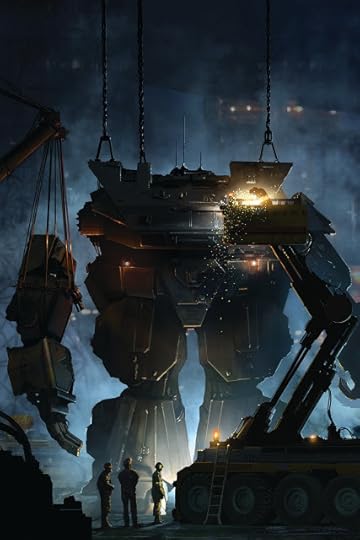
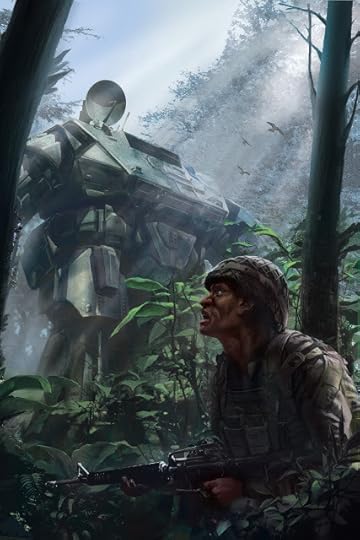
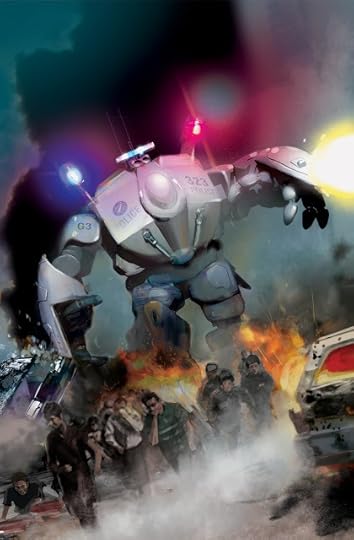
 Grant Imahara (tertiary host of Discovery Channel's MYTHBUSTERS) works on MORAV Generation 1 robot understructure
Grant Imahara (tertiary host of Discovery Channel's MYTHBUSTERS) works on MORAV Generation 1 robot understructure 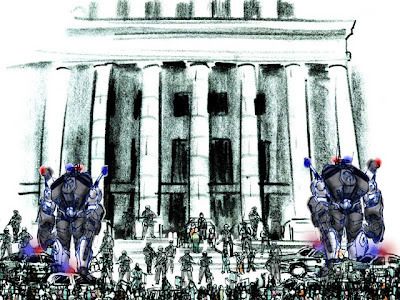 Tangri Capitol story board
Tangri Capitol story board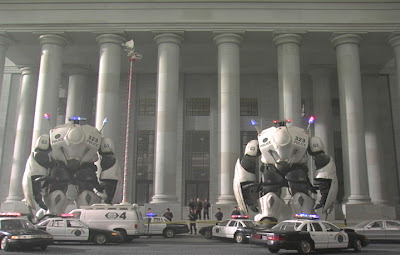 Tangri Capitol camera-ready finished product
Tangri Capitol camera-ready finished product1. How did you get into writing?I started writing because my head fills with ideas, characters and stories that feel real to me in some way. It is almost compulsive, like I have to get the ideas out or I’ll explode. Then I need to do something with the stories, right?
A writer friend M. Zachary Sherman liked MORAV and convinced me to create a graphic novel with him. The book took four years and a team of twenty artists to complete. We’re very proud of our achievement. The book has a story you can’t put down and it is packed with 164 pages of amazing full color art.
I’m not yet comfortable calling myself a “real writer”. I oversee so many parts of the projects I create, that I often work with the help of a dedicated script writer. Naturally I feel like they are the “real writer”. I drive the big picture and the flavor, but the writers on my team share in a really significant part of what my stories become.
2. What do you like best (or least) about writing?I really enjoy seeing a story and characters come to life, piece by piece, becoming more real every day. I like the way it feels to live in these crazy worlds I create and of course, leave whenever I want.
3. What is your writing process? IE do you outline? Do you stick to a daily word or page count, write 7 days a week, etc?I like to write at night after work or even after everyone goes to sleep, so I am not interrupted. The first thing I do is find a mood, create the world and then populate it with the essential characters. I try to imagine what is wrong with those characters and their world. I immerse myself until I live in the story, then I watch what happens. My stories lack structure in the beginning, but that’s because I need to feel that place before I can write in it. I eventually reach a point where I have to create an outline. It’s at that point I have to either start dedicating a lot more time to the project or work with another writer. We or I fill in the blanks, usually focusing on a scene at a time, and not always in chronological order. I have the outline with key turning points for continuity. Then I read, revise and polish again and again until the story has soul and I don’t see anything I want to change.
4. Who are some other writers you read and admire, regardless of whether they are commercially “successful?”I have always enjoyed William Gibson. He paints such a clear picture of the world and characters in his stories. I like to be immersed and forget I’m reading a book. Ironically, I don’t have much time to read.
5. Should the question mark in the above question be inside or outside the quotes?I don’t know, ask my editor or wife. :-P Actually, I do know it belongs on the outside, but I feel like it should be on the inside. I’ve never liked that rule. It conflicts with the right side of my brain.
6. What’s your stance on the Oxford Comma?I don’t use the Oxford Comma for no other reason than that is the way I was taught. The same reason I still double space after periods.
7. What is your book MORAV: The History of Robotic Warfare about and how did it come to fruition?MORAV is a science fiction military drama about a cocky pilot and his fellow soldiers, who fight for answers and survival when their home island of Tangri becomes a corporate testing ground for giant robotic warfare.
8. What’s your current writing project?I am juggling several writing projects, right now. It’s an unfortunate reality of our current economy. I am pitching a zombie story, a creature feature, a futuristic comedy and two sequels to MORAV. I’ll finish the one that I get paid for.
9. What book(s) are you currently reading?Sadly I’ve been working so many hours I have not had much time to read the science fiction stories I love so much. Instead lately I’ve been studying books like The DV Rebels Guide by Stu Maschwitz and The Guerilla Film Makers Movie Blueprint by Chris Jones.
10. Who or what inspires your writing?I feel like the constant disappointment I feel from dry and formulaic movies and television shows has been driving me. I am basically writing what I want to read or see.
Finally, is there anything you’d care to add? Please also include where people can read your published stories, buy your book, etc.
https://twitter.com/Foncocreative
https://www.facebook.com/FonHDavis
http://morav.net/
http://foncocreative.net/
Thank you, Fon. I thoroughly enjoyed MORAV and would recommend it. The book is simply gorgeous, the artwork is jaw dropping (and sometimes graphic; parents take note), and the story well developed.
Okay, folks, I've already got my signed copy of MORAV. Now is your chance to get yours. Simply leave a comment below, including your email address where I can contact you once a winner has been chosen a random. Contest ends Monday October 15, 2012 11:59 pm PST.
Additionally, you may purchase a copy of MORAV on Amazon by clicking HERE.
Published on October 09, 2012 15:06
October 3, 2012
10 Questions with Historical Fiction Author Michelle Diener (@michellediener)
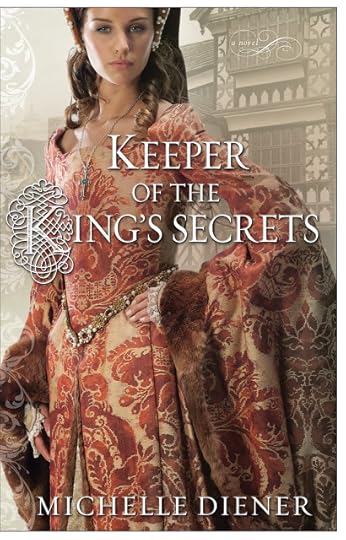
This Author Spotlight features historical fiction author Michelle Diener, author of KEEPER OF THE KING'S SECRETS.
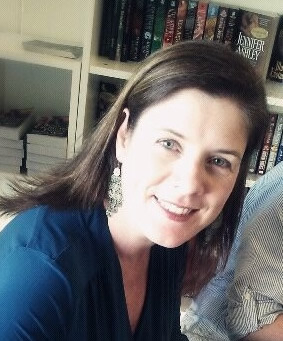
Michelle Diener writes historical fiction for Simon and Schuster's Gallery Books.
Her debut novel, IN A TREACHEROUS COURT
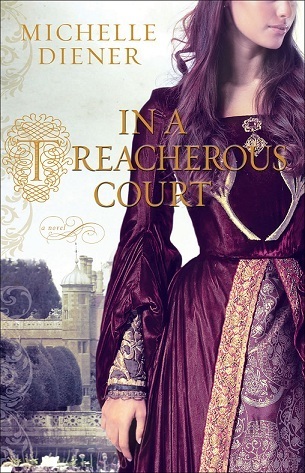
released in August, 2011, is set in the court of Henry VIII. It features the real historical figures of illuminator and painter, Susanna Horenbout, and Henry's Keeper of the Palace of Westminster and Yeoman of the King's Robes, John Parker. A second book, also featuring Susanna and Parker, THE KEEPER OF THE KING'S SECRETS, was published on April 3rd, 2012.
Michelle is also the author of DANGEROUS SANCTUARY.
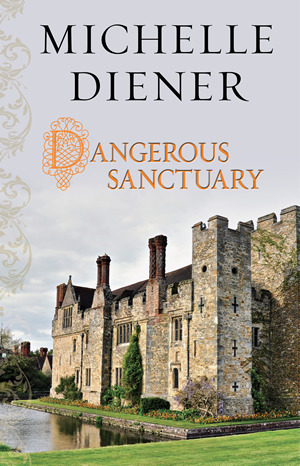
She was also featured in the anthology ENTANGLED.
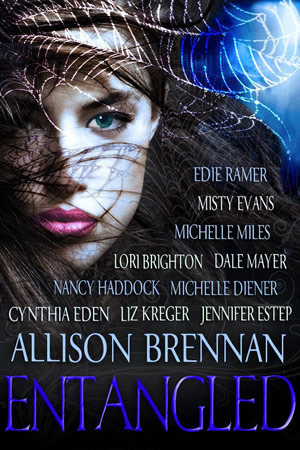
THE EMPEROR'S CONSPIRACY, a historical novel set in London during the Napoleonic Wars, is set for a November 27th, 2012 release. Here is a sneak peek at the cover art:
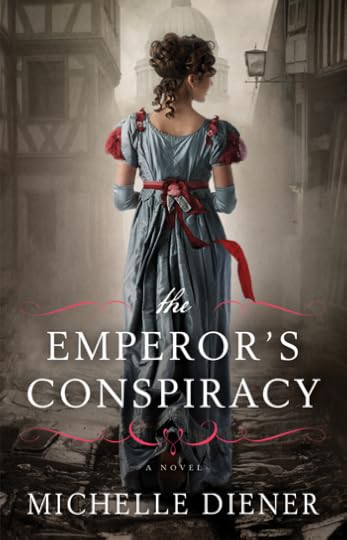
1. How did you get into writing? I'm one of 'those' authors who've never not written. I'm the oldest of five children and if I wasn't writing stories, I was telling them to my brothers and sisters. Forget mounted DVD players, I was the in-car entertainment on long trips. My friends and I were captivated by the manga cartoons on TV as children, and I'd write spin-offs of those tales of high adventure in space for my friends as well.
2. What do you like best (or least) about writing? I love the feeling at the very end of a book, where all you're doing is deepening, and layering and making it really pop. I hate everything that I have to do to get to that stage. Expect maybe writing the first three chapters. From then, it becomes a tortuous journey I wish would end.
3. What is your writing process? IE do you outline? Do you stick to a daily word or page count, write 7 days a week, etc? I generally write a single page or maybe two pages at most as an outline. I then never look at it again, but at least I know there is a beginning, a middle and an end that holds together and makes sense. I sometimes try to keep to a page count, especially when I'm at the middle and I'm hating every word. Page counts force me to work. But if I'm in the swing and it's all coming easily, I don't worry about that. I couldn't even say how many pages I write on those days, but I don't care, because I'm having fun.
4. Who are some other writers you read and admire, regardless of whether they are commercially “successful?” I really love Terry Pratchett, for his cleverness, and his dry wit, and his wonderfully real characters. I'm in awe of Iain M. Banks's talent. His books really come alive for me, and he's the one sci-fi author I auto-buy without question. I love Patricia Briggs for her wonderful world-building and amazing characterization, and Jayne Anne Krentz for her amazing mix of romance and suspense. In my time, I've also devoured Dick Francis (when his wife was still writing with him), Agatha Christie, PD James and Deborah Crombie, to name a few.
5. Should the question mark in the above question be inside or outside the quotes? Outside. :)
6. What’s your stance on the Oxford Comma? Ah, the Oxford comma. That staple ice-breaker at cocktail parties everywhere. To quote Lynne Truss: “There are people who embrace the Oxford comma and people who don't, and I'll just say this: never get between these people when drink has been taken.” Being British myself, and having been brought up through a school system that did not believe in the Oxford comma, you would think I would eschew it totally. But again, to quote Lynne Truss (who is my favorite grammarian) commas 'tell the reader how to hum the tune', and so, if the Oxford comma facilitates a good tune, makes the song more easy to understand, I'll use it. If it doesn't, I won't.
7. What is your book KEEPER OF THE KING’S SECRETS about and how did it come to fruition? Keeper of the King's Secrets is my second book set in the court of Henry VIII featuring Susanna Horenbout, a Flemish artist who worked in his court, and John Parker, Henry's Keeper of the Palace of Westminster (the first book is In a Treacherous Court). Both Susanna and Parker existed and while the intricate plots I throw them into are made up by me, the history around them, and the catalysts that drive the plot are quite factual. I started writing the books because I was fascinated by Susanna Horenbout. I'd never heard about a woman artist working for Henry VIII, and there is very little information about her. The idea of a woman working in a completely male-dominated field for one of the most powerful monarchs of his time was something that sparked my imagination.
8. What’s your current writing project? I'm just in that golden phase I mentioned above of putting the final touches on a novel set during the Napoleonic Wars, which is linked by a few characters to my upcoming November release The Emperor's Conspiracy.
9. What book(s) are you currently reading? I'm reading Juliet Nicolson's The Great Silence: 1918-1920 Living in the Shadow of the Great War for research purposes.
10. Who or what inspires your writing? Everything around me inspires me. Other books, films, life, people I meet, situations I see, history. It's all grist for the mill.
Finally, is there anything you’d care to add? Please also include where people can read your published stories, buy your book, etc. Thanks for inviting me over, Ryan. It's been fun. People can find out more about my books at michellediener.com.
You're welcome, Michelle. We shall speak soon for the release of THE EMPEROR'S CONSPIRACY.
Be sure to visit Michelle's website and follow her on Twitter: @MichelleDiener
Published on October 03, 2012 02:12
September 25, 2012
10 Questions with Bram Stoker Award-winning Horror Writer Benjamin Kane Ethridge (@bkethridge)
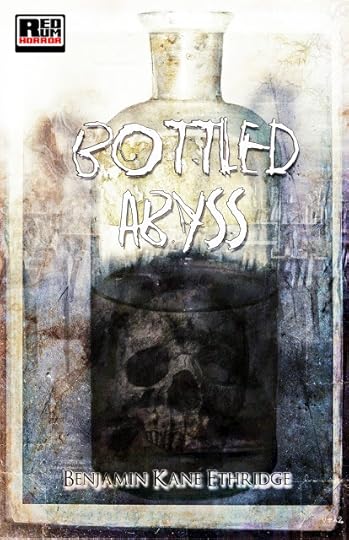
This Author Spotlight features Benjamin Kane Ethridge.
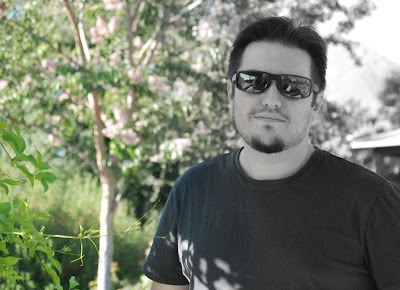
Benjamin Kane Ethridge is the author of the novel BOTTLED ABYSS (see above), BLACK & ORANGE (Bad Moon Books 2010), for which we won the coveted Bram Stoker Award,
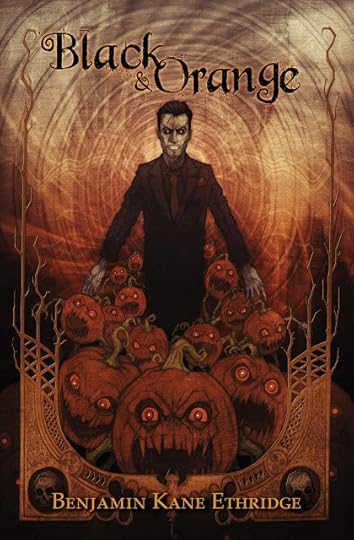
and the forthcoming DUNGEON BRAIN (Nightscape Press, coming fall 2012). For his master's thesis he wrote, "CAUSES OF UNEASE: The Rhetoric of Horror Fiction and Film." Available in an ivory tower near you. Benjamin lives in Southern California with his wife and two creatures who possess stunning resemblances to human children. When he isn't writing, reading, or videogaming, Benjamin's defending California's waterways and sewers from pollution.
1. How did you get into writing?
My parents had a typewriter, and to my utter astonishment, I discovered I could type both black and red colored words. After I ran down the red ink ribbon, typing gibberish, I just continued on from there with black ink, which continues to this day via computer.
2. What do you like best (or least) about writing?
I like returning to my work and being surprised with what I find. And I also hate returning to my work and being surprised with what I find.
3. What is your writing process? IE do you outline? Do you stick to a daily word or page count, write 7 days a week, etc?
I start with the ending of a story, so I always know how it ends, but I’m never exactly sure how it gets there. I create an incomplete, loose outline that advances a few chapters at a time. I try to keep at a 3000-word-a-day rate, for five working days a week. I’ve been terribly lazy lately though and have been doing 1800-2000 words. It doesn’t help when I’m busy with other parts of life as well. The good thing though is I feel bad about it and try to improve my numbers after too long.
4. Who are some other writers you read and admire, regardless of whether they are commercially “successful?”
I normally answer this question with a range of literary marquee writers, but some (but not all) other fabulous writers are: Michael Louis Calvillo, Robin Spriggs, Greg Lamberson, Ed Kurtz, Jeff Strand, Wrath James White, Sam W. Anderson, Gene O’Neill, Lisa Morton, Brad Hodson, John Palisano, Richard Payne, JG Faherty, and Jeff Wilson.
5. Should the question mark in the above question be inside or outside the quotes?
Inside.
6. What’s your stance on the Oxford Comma?
In fiction, sometimes it depends on the rhythm you’re going for. But most often I’d say comma placement depends on how the items are related. If you say, “The senator was detested, loathed, and hated,” the last comma doesn’t look right to me. Here’s why: the verbs are too similar—that final comma creates a pause to infer a stress on the last item, which doesn’t require one because of the repeated idea. However, if you say, “The senator was disrespectful, handsome, and cowardly,” it looks spot-on, especially if the most important thing you’re trying to communicate is the senator’s cowardice.
Benjamin, you are the first author to discuss the stylistic implications & applications of the comma versus the grammatical requirements of it. I often deviate from established "rules" of writing when I want to create an effect or an emphasis, or simply to wax eloquent. Thank you for illustrating this.
7. What is your book BOTTLED ABYSS about and how did it come to fruition?
Bottled Abyss is about a couple who have lost their child and are disconnecting from life. They happen upon a bottle containing water from the River Styx one day and discover that the waters can heal and kill. What they decide to do with that power unfolds in the pages thereafter.
Fruition? I was in a morbid mood for a few months, so I decided to write something that took advantage of that state of mind.
8. What’s your current writing project?
I’m working on the NIGHTMARE BALLAD trilogy. I can’t say much about it, other than it’s going to drive people out of their damn minds. I’ve already lost mine just writing it.
9. What book(s) are you currently reading?
The historical adventure novel, “Two for Eternity,” by Carl Alves. It’s a lot of fun so far.
10. Who or what inspires your writing?
Reading great writing inspires me. Some people say reading bad writing inspires them, but not me. I start wondering what the point is, especially if dribble and dreck can make it to press and people actually buy it (probably questioning if they’ll ever pleasure-read again). It’s depressing. So, whenever possible, I try to read the good stuff and make-believe that all readers want good writing.
This is an excellent point, Benjamin. I have often found myself thinking the same thing. I read widely, both traditional and indie authors. I must say I find quality writing at both ends of the publishing spectrum. But, as you said, I enjoy reading really great writing; it's very inspiring. That being said, poor writing is also beneficial because it helps me re-remember for the umpteenth time what weak writing is. It also takes some of the pressure off me, because I re-remember, again for the umpteenth time, that a powerful story is not built solely upon grammar and syntax and style; it is the STORY which ultimately matters.
Finally, is there anything you’d care to add? Please also include where people can read your published stories, buy your book, etc.
For a listing of my novels, here’s my Amazon author page. Have at it, you beautiful, sexy, generous people.
www.amazon.com/author/benjaminethridge
Thank you, Benjamin. Congratulations on the Bram Stoker Award. No small feat, that.
Be sure to take a moment to check out BOTTLED ABYSS and BLACK AND ORANGE. And stay tuned for the forthcoming release of DUNGEON BRAIN, which will be featured here in a follow-up interview with Benjamin.
Published on September 25, 2012 08:35
September 18, 2012
10 Questions with Writer Michael E. Gunter (@Michael_Gunter)
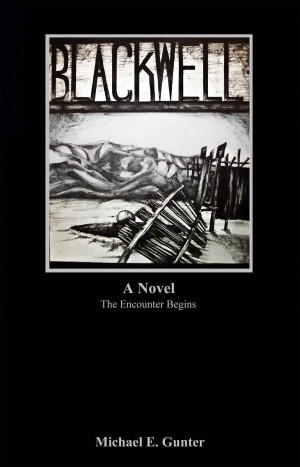
This Author Spotlight features Michael E. Gunter, author of BLACKWELL.
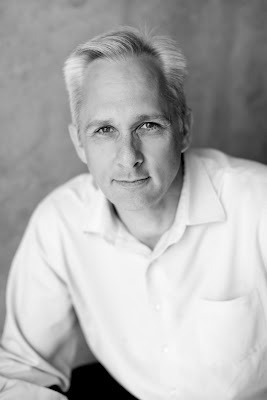
At the age of ten, Michael saw his first episode of The Twilight Zone and got hooked on mystery. At eighteen, he had an encounter with Jesus Christ that changed the course of his life.
In 2001, he discovered his passion for writing. Today, he writes about the mysteries of life from a biblical Christian perspective; sometimes in straight up nonfiction and sometimes in the garb of fiction. His aim is to write great books that entertain and provoke meaningful contemplation and conversation.
When Michael is not writing, he enjoys spending time with his wife and kids, playing guitar, and refilling his favorite coffee cup.
Now through Monday, Michael is offering a limited number of free ebook copies of BLACKWELL. Simply leave a comment on this Author Spotlight. Be sure to include your EMAIL ADDRESS to which Michael can send your free ebook, as well as which ebook format your prefer (epub/mobi).
1. How did you get into writing?
I started dabbling with words as a teenager dreaming of rock-and-roll stardom. I wrote song lyrics to fill the space between guitar solos. After seventeen years of dream chasing, I woke up to find I had turned into a thirty-one-year-old man working in a Books-A-Million – no record contract, no screaming fans, no longer in a band. This may sound odd, but I really believe I had to let my musical aspirations fade before I could discover my real passion. Working amidst all those books, I could almost hear them whisper to me, “You can do this. Give it a try.” In April of 2001, I wrote my first short-story, then three more in quick succession. By then I was hooked and I haven’t been without a writing project since.
2. What do you like best (or least) about writing?For me, the coolest thing about writing is the clarity it brings. Whether I’m giving life to a fictional character or writing non-fiction, I always end up learning something, expanding my view of the world, or diving deeper into the Great Mystery of life. Of course, there’s the entertainment factor and the satisfaction of bringing a very long project to conclusion, but it’s the clarity that I value most and what I hope to give to my readers.
The thing I like least about writing is the tension that exists between the worlds I create in my stories and the physical world in which I live. Both are demanding and neither seems to care much about the other. Sometimes I feel caught between them, developing a plot when I should be focused on work or family, or getting distracted by a task when I should be writing.
3. What is your writing process? IE do you outline? Do you stick to a daily word count, write 7 days a week, etc?
Although I’ve been writing seriously for eleven years, my writing process is still developing. Here’s what it looks like now: My designated writing day is Monday 9:00 am to 2:00 pm. I go to bed Sunday night thinking about a scene or chapter I want to write and wake up Monday ready to go. Lately, I’ve been able to add Saturdays and a night or two during the week, depending on what’s going on in the physical world. I do not have a word count goal, but can usually hit 2000. I feel like I’m a pretty slow writer. When I was writing non-fiction, I allotted myself one full year per project. But now that I’m writing fiction almost exclusively, I find that it takes me longer to get to know my characters and live with them in their world. No time is wasted. Even when I cannot write for several days, the story is still developing. As for outlining, that’s something I am trying to do more. It’s hard though as my characters don’t like it much.
4. Who are some other writers you read and admire, regardless of whether they are commercially “successful?”
Without hesitation, my two favorite writers are C. S. Lewis and Jack Finney. Lewis’s writings were instrumental in my spiritual development as a young man. I read The Great Divorce and Mere Christianity back to back and experienced something of a connection right away. I know it’s popular to mention and quote C. S. Lewis, but I can honestly say I admired him before I knew anything about him. Finney is the master of the time travel story. His depiction of the late 19th century makes me suspect he may have actually visited it. You could say my own fascination with the idea destined me to find him. If I ever figure out how to do it, I’d like to go back and meet both of these men.
5. Should the question mark in the above question be inside or outside the quotes?
Funny you should ask this question. I’ve always thought it looked strange to put the question mark inside, but that’s what my high school English teacher taught us so that’s how I do it.
6. What is your stance on the Oxford Comma?
Confession time. I’d never heard of this until you asked so I had to look it up. Again, I must give a nod to my high school English teacher who taught us to use it. My wife disagrees, as does her mother, who happens to be something of an editing wizard. But do I listen to them? Nope. I have a slight addiction to the comma, but I am seeking help.
7. What is your book, BLACKWELL: The Encounter Begins, about and how did it come to fruition?
BLACKWELL is about two couples, one human and the other extraterrestrial, living together on a ranch in Central Wyoming. When their idyllic life is threatened by an intergalactic assassin looking to settle an ancient score, loyalty and truth are put to the test. The idea for this novel began in 2001 as a short story entitled, “They Came, They Saw, They Stayed for Dinner.” One of the extraterrestrial characters stayed with me and even showed up in some of my other writings. Finally, in 2007, he convinced me to write his complete story. After a year of writing, he informed me that I’d written it all wrong and I should start over to get it right. So I shelved my first manuscript and started again. It was complete to his satisfaction in 2010 and published in 2011.
8. What’s your current writing project?
I am about one year and 100,000 words into BLACKWELL II. The story takes place fifteen years later and revolves around the daughter of Aldi and Elsa-Eska, the extraterrestrial couple from the planet Klyv. Although she is Klyvian, Sara has spent her entire life on Earth among humans. SPOILER ALERT: The villain from BLACKWELL is back and determined to finish what he failed to do fifteen years earlier.
9. What books are you currently reading?
I am reading The Enchantress: The Secrets of the Immortal Nicholas Flamel by Michael Scott, Beautiful Outlaw by John Eldridge, and The Imitation of Christ by Thomas A. Kempis.
10. Who or what inspires you to write?
I am inspired to write by the belief that there is a Great Mystery at work behind the scenes of what we perceive as reality. Writing takes me to that place where the curtain is thinnest.
Finally, is there anything you’d care to add? Please also include where readers can find you online and buy your books.
All of my published works are available at www.gunterbooks.com. BLACKWELL: The Encounter Begins is also available at Amazon.com and Barnesandnoble.com. E-book versions are available via all e-reader stores.
Thank you, Michael. Be sure to visit us again when BLACKWELL II is published.
Visit Michael's website to check out BLACKWELL, as well as his other work. And follow him on Twitter.
And to be one of the lucky few to receive a free ebook copy of BLACKWELL, post a comment below, including your email address and ebook format preference.
Thank you!
Published on September 18, 2012 10:12
September 10, 2012
AMPED by Daniel H. Wilson (@DanielWilsonpdx) - Review by Author Ryan Schneider

A well-written, scary look at our inevitable technological future. A solid read. After enjoying ROBOPOCALYPSE, I was pleased to find AMPED in my library's ebook inventory. AMPED wasn't quite as epic in scope as ROBO, but Wilson uses his insights into robotics and technology to predict what I truly feel is a technological inevitability. Technology which already exists TODAY need be tweaked only slightly in order to be realized as the vision painted by Wilson in AMPED. And it's a controversial one.
Specifically (and without giving anything away!), the story revolves around neurological implants used to treat maladies such as epilepsy and Parkinson's. As I said, the technology exists and is in use today. Now, imagine such an implant which could generate a mild, steady electronic pulse which would nudge your brain waves into a constant state of concentration. As Wilson states in the novel (and I'm paraphrasing), such technology will make a dumb person normal and a normal person a genius.
The real-world applications of such technology become readily apparent. As does its attractiveness.
And also the moral quandary. (Which Wilson explores thoroughly.)
If I had to choose something to complain about, it would be that the book felt a tad bit limited in terms of the interaction between the hero and the antagonist. I kept thinking of the redneck in REAL STEEL who beats the crap out of Hugh Jackman.
But the book does indeed have several nice surprises (which I won't spoil here). There's an ample love interest and a nice portrayal of paternal action by the hero; important stuff which is always challenging to write without it being corny or melodramatic.
Of particular note is Wilson's almost lyrical voice. He savors his words and his metaphors are brilliant. And of course the sheer concept of the novel is fascinating and utterly believable. The execution is also fun, as the book incorporates news reports, government documents, court rulings, and journalistic reports to assist with the storytelling. This was a brilliant, inventive way to take a break from what could easily become long-winded exposition.
Recommend.
Published on September 10, 2012 11:02



